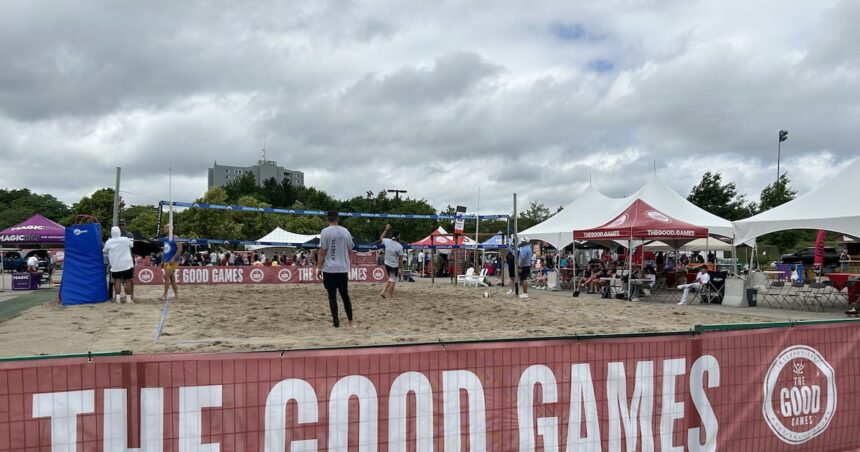I walked the University of Guelph campus grounds last weekend where the spring air vibrated with an energy rarely seen outside professional sporting venues. Thousands of participants—most without any elite athletic credentials—gathered on the sprawling fields for what organizers affectionately call “the Olympics for regular people.”
“This isn’t about being the fastest or strongest,” explained Marissa Chen, co-founder of the Guelph Community Sports Festival, now in its fourth year. “It’s about creating space where everyone, regardless of ability or background, can experience the pure joy of movement.”
The festival hosted over 4,000 participants across two days, transforming the university’s athletic complex into a colorful patchwork of activity zones. Children raced through obstacle courses while seniors competed in modified lawn bowling tournaments. Office workers who spend weekdays hunched over computers played volleyball alongside students half their age.
What struck me most walking between events wasn’t the athletic prowess on display, but rather the unmistakable sound of laughter punctuating every competition. Teams with matching t-shirts bearing punny names like “Sets on the Beach” and “The Incredi-Bowls” gathered under tents between events, sharing homemade energy bars and stories.
Chen, who developed the festival after noticing declining community participation in recreational sports, pointed to concerning data from ParticipACTION showing only 16 percent of Canadian adults meet physical activity guidelines. The Public Health Agency of Canada has linked this inactivity epidemic to rising healthcare costs estimated at $6.8 billion annually.
“We’re fighting a public health crisis with community and fun,” Chen said, watching a group of middle-aged participants celebrate after completing a relay race. “Traditional fitness approaches aren’t working for most people.”
The festival’s accessibility-first approach became evident when I spoke with Gurdeep Singh, a 42-year-old accountant competing in his first organized athletic event since high school.
“I always felt intimidated by gym culture,” Singh admitted, catching his breath after finishing the community 5K walk. “But here? Everyone cheers for the person finishing last just as loudly as the person finishing first.”
Singh’s experience reflects growing evidence that community-based physical activity initiatives often succeed where traditional fitness programs fail. Research published in the Canadian Medical Association Journal shows social connection can be a stronger predictor of physical activity adherence than personal motivation alone.
Accessibility extends beyond psychological barriers. Festival organizers worked with local disability advocacy groups to ensure all 25 events offered modified versions for participants with mobility challenges. This included seated volleyball competitions and guided running opportunities for visually impaired participants.
“We’ve partnered with the Canadian Paralympic Committee to implement their accessibility guidelines,” explained volunteer coordinator Jade Williams. “But honestly, some of our best ideas come directly from participants who tell us what they need.”
The festival’s economic impact hasn’t gone unnoticed by local businesses. The Guelph Chamber of Commerce estimates the weekend generates approximately $250,000 for local restaurants, hotels, and shops. Downtown café owner Marcus Freeman told me his sales doubled during festival weekend.
“These aren’t just customers—they’re community builders,” Freeman said. “One group came in after their basketball tournament, covered in sweat, talking about starting a weekly league. That’s the magic of this thing.”
As sunset approached on Sunday, I watched the closing ceremony where hundreds gathered on the main field. Unlike Olympic ceremonies with their polished performances and celebrity appearances, this featured impromptu dance competitions and community recognition awards.
The festival’s growth mirrors a broader cultural shift happening in communities across Canada. According to Statistics Canada, participation in non-competitive recreational sports has increased 12 percent since 2015, while elite sports participation has remained relatively flat.
University of Guelph kinesiology professor Dr. Eleanor Hayward, who studies community health initiatives, believes the festival represents an important evolution in how we think about physical activity.
“The fitness industry has traditionally focused on individual achievement and appearance,” Dr. Hayward explained as we watched the three-legged race finals. “What we’re seeing here is a return to movement as a communal, joyful experience rather than another self-improvement project.”
As I prepared to leave, I noticed Chen sitting quietly on the sidelines, watching a spontaneous game of tag that had broken out among participants of various ages.
“Success for us isn’t measured in attendance numbers or revenue,” she reflected. “It’s in moments like that—when strangers become playmates, when people remember how it feels to move their bodies without judgment.”
Registration for next year’s festival opens in January, and organizers expect participation to grow by at least 30 percent. They’re already planning expansions including winter activities and more family-oriented events.
In a world increasingly divided by politics, technology, and social barriers, the Guelph Community Sports Festival offers a powerful reminder that sometimes the most revolutionary act is simply playing together.






